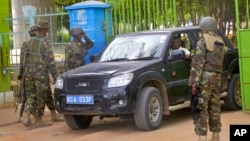On the streets of Nairobi, Kenyans are talking about a photograph on page two of The People's Daily newspaper. Attached to a story about John Kerry’s visit, it shows a heavily-armed American soldier, in full body armor, with an assault rifle in his hands and another sidearm strapped to his leg. Next to him is a Kenyan police officer seemingly unarmed in a standard issue uniform, no body armor, standing with his arms behind his back.
For Chery Ogola, the picture is worth a thousand words.
“The Kenyan policeman is just plain; it’s just the uniform that tells you he’s a policeman, otherwise you would mistake him for a watchman," says the 24-year-old student. "He doesn’t have any sort of protection, even a gun holder, a simple gun holder. It’s a very bad image.”
Although the picture isn't truly indicative of the preparation of Kenyan security forces on the whole, Ogola says it sends a message to Kenya’s enemies.
“It’s so bad. It shows the level of security we have, and it’s so saddening," she said. "I’m sure if someone was planning an attack, even if they don’t know anything about Kenya, if they just see what we have to present, that can really tell them a lot. And those are the loopholes they take advantage of.”
Like other Kenyans still reeling from a recent spate of attacks by the al-Qaida-linked, Somalia-based al-Shabab militants, Ogola is hoping this week's visit by U.S. Secretary of State John Kerry will mean greater U.S. support for Kenya’s war on terror.
In fact, much of the talk surrounding the diplomatic stopover has focused on specifically what kind of assistance the United States can provide.
Lorraine Mumia, a student in Mombasa, is one of many Kenyans still shaken by the group’s April assault on a university campus in the northeastern town of Garissa that left 148 people dead, and had many in the country crying out for better security.
“Personally, I lost a cousin in Garissa [to] al-Shabab. She had like five bullets in her," said Mumia. "When we were going to see her in the morgue, I could not even recognize her. So we really need that addressed — security. We really need that.”
The U.S. gave about $10 million in direct counterterror support to Kenya in 2014 and has spent hundreds of millions of dollars to help fund and equip the African Union mission in Somalia known as AMISOM, of which Kenya is a member.
Some, however, say Kenya should not be singled out by the United States as a troublesome country.
“Terrorism is not a Kenyan problem," says Joshua Bosire, a Nairobi-based surveyor. “Terrorism is a universal problem. It’s a threat to the U.S. It’s a threat to most African countries; to Europe; all over the world.”
One way or another, Kenya has a security problem: al-Shabab has vowed to continue attacks in retaliation for Kenya’s military involvement in Somalia.
Whether assistance comes from the United States or elsewhere, Kenya can use all the help against terrorism it can get.




